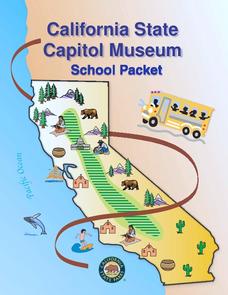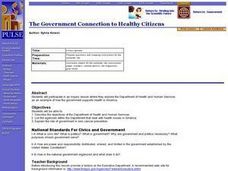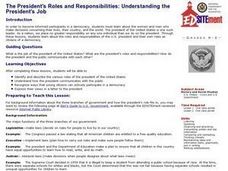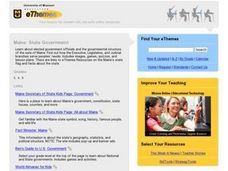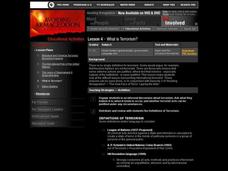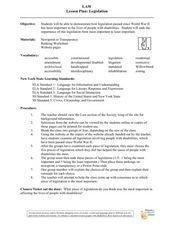Curated OER
How the Supreme Court Affects the Lives of Teens
Students describe the structure and function of the United States Supreme Court. They examine and analyze decisions made by the Court. They participate in a debate about recent issues.
Curated OER
Constitution Lesson Plan
Third graders identify roles of Declaration of Independence and U.S. Constitution in establishing new country, create posters with their ideas about each part of Constitution, and explain three branches of government, including their...
Curated OER
Citizenship and the Constitution
Students identify government officials and resources on a local, state and national level. They determine the structure of local, state, and national governments.
California State Parks
California State Capitol Museum School Packet
Here is great packet of worksheets to introduce your young learners to the general history of California and basic facts about the Golden State. Topics covered range from state counties, Sacramento, and the capitol to the...
School Improvement in Maryland
Executive Order
After reading information about Executive Order #9066, class members assume the voice of an 18 year-old Japanese-American born in California and placed in an internment camp. Individuals then craft a letter to President Roosevelt...
National Endowment for the Humanities
George Washington: The Precedent President
Everyone knows that George Washington was the first president, but do your scholars know why that was so important? The lesson plan, the third in a sequence of three, allows learners to understand how George Washington set a precedent...
Curated OER
Same-Sex Marriage Legalized in New York
Same-sex marriage is the hot topic discussed in this New York Times article. Upper graders read the article and then answer eight comprehension questions. Note: This article is more about the Senate and legislation than about same-sex...
C-SPAN
Judicial Review and Marbury v Madison
The Supreme Court case Marbury v. Madison may not be widely recognized but the landmark case is particularly significant because it established the precedent for judicial review and that the Supreme Court had power as an interpreter of...
Curated OER
A More Perfect Union
Fourth graders complete a unit of lessons on the development of the U.S. government. They examine the main ideas of the Declaration of Independence, develop a class translation of the preamble to the Constitution, create a flow chart,...
Curated OER
Documents and Symbols and American Freedom
Students complete a unit of lessons on the documents, symbols, and famous people involved in the founding of the U.S. government. They create a personal bill of rights, write a found poem, design a flag, conduct research, and role-play...
Curated OER
The Government Connection to Healthy Citizens
High schoolers describe the objectives of the Department of Health and Human Services. They list the agencies within the Department that deal with health issues in America. Students explain the role of government in skin cancer prevention.
Curated OER
The President's Roles and Responsibilities: Understanding the President's Job
Students examine the roles and responsibilites of the president of the U.S. They identify and discuss the three branches of U.S. government, view and discuss a White House Photo essay online, and create a class book entitled, 'If I Were...
Curated OER
Utah's Judicial Branch
Seventh graders explain that the judicial branch of Utah's government interprets laws and reviews the consitutionality of laws.
Curated OER
Did You Know?
In this government instructional activity, students read a one page text about the Congress, House of Representatives and Senate. Students write the names of the Senators and Representatives from their state.
Curated OER
4-H Citizenship Activity Page
In order to understand how our government works, students need to delve into the intricacies at both the local and federal level. Using this 20 question activity learners explore how government affects their daily life.
Curated OER
Constitutional Issues: Watergate and the Constitution
Students take and defend positions on what conditions contribute to the establishment and maintenance of a constitutional government. They debate whether or not the government should have prosecuted Nixon over the Watergate scandal.
Curated OER
Woodrow The White House Mouse
Inauguration Day is January 20. Implement an entire week's worth of mini activities to help young historians become knowledgeable of the President's job, the executive branch, and the White House. The worksheets focus on research skills,...
Curated OER
Government for the People
Seventh graders read about the three branches, the balance of power an the system of checks and balances. They analyze current events in terms of which vranch of government is responsible for addressing issues. Students create a poster...
Curated OER
Maine: State Government
Young scholars participate in interactive lessons to study the history and government of Maine. They observe the studenT Cabinet of Maine and assess its goals and work.
Curated OER
Third Grade Social Studies
In this social studies learning exercise, 3rd graders complete multiple choice questions about laws, government, states, and more. Students complete 25 questions.
Curated OER
Avoiding Armageddon
PBS has written a series of lessons on avoiding Armageddon. This is lesson 4 of 5 and focuses on defining terrorism. Upper graders watch episode 3 of "Avoiding Armageddon - The New Face of Terror," read how terrorism is defined by the...
Curated OER
Legislation
Young scholars rank the legislation of disabilities since World War I and write their rationale for the ranking. For this legislation of disabilities lesson plan, students do this for 5 legislations that have been passed.
Curated OER
Creating the Constitution
Useful as a review assignment or as a quiz, these ten questions on the U.S. Constitution address its creation. Thomas Jefferson, John Adams, and Ben Franklin are the main topics of the questions, as well as The Three-Fifths Compromise.
Curated OER
Mock Congress
High schoolers simulate the legislative process of law-making by assuming different roles. They investigate the process by writing a bill on any subject of his/her own choice





